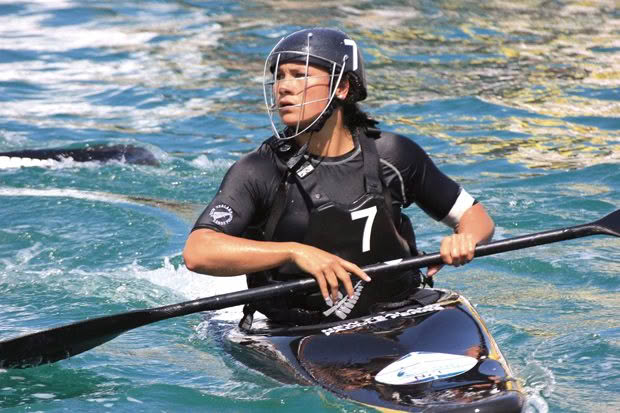New Zealand canoe polo champion Jordan Aria Housiaux paddles own path

Whether competing in canoe polo or discovering more about the ocean’s sharks and whales, this sporting talent is paddling her own path.
Jordan Aria Housiaux was destined to make waves. The 26-year-old’s grandfather and father were both Otaki Beach surf lifesavers (her dad is still involved with the club), so she spent her childhood on the beaches, and in the rivers and pools along the Kapiti Coast. Should a rogue paddle make contact during a particularly intense game of canoe polo, her sport of choice, it wouldn’t be surprising to see her blood run ocean blue.
Wayward paddles and capsizing kayaks are just part of the fun of canoe polo, a sport that is gaining momentum in New Zealand thanks to increasing success on the international stage. Jordan has been playing for 15 years; in 2016, she captained the Paddle Ferns (New Zealand’s national women’s team) to victory at the World Championships in Sicily, Italy.
“I grew up on the sidelines of matches,” says Jordan. “My dad played and I was thrown in the deep-end as early as possible. There are photos of a five-year-old me going downriver in a kayak.” Despite a bumpy start, Jordan quickly found her balance.
“I remember my first tournament; I was placed with the older kids at the local high school since there was no team for my age. I was terrible, couldn’t even paddle straight. But, I didn’t give up, I kept going back and evolved as a player. My brother mainly remembers my early days, so he commented after watching the World Champs, ‘Oh, you’re good now’.”
Canoe polo is like basketball in boats. The playing pitch (usually a lagoon or lake, but games are also played in pools) is 35 metres long and 23 metres wide, with a goal either end two metres above the water. Over two 10-minute halves, two teams of five players each compete to score goals. “Like basketball, you can dribble, pass and shoot, but you can also defend by blocking shots with the paddle and pushing players over if they have the ball.” It’s a physical game; while the halves may be only 10 minutes’ long, Jordan says that’s “enough to leave you completely knackered.”
Despite having carbon kayaks that can be used as barriers, canoe polo is still a full-contact sport and protective gear is a must – including life jackets and helmets. “It’s an awesome physical game but also mental as you need to play strategically.” Like any sport played at international level, significant training is needed to reach match fitness. All that tipping, turning, tossing and throwing doesn’t come easily; the Paddle Ferns have strict individual routines and attend training camps in the lead up to tournaments. Jordan switches between the gym and on-water work-outs, aiming to hit the gym three times a week and the water four times.
There are three national A-league events and a variety of club competitions during summer, where players compete in three games a day. “Canoe polo has been around a long time but is growing in popularity,” she explains. “High schools are leading the charge by getting people involved. It’s a close community, and we’re all good mates.”
The Paddle Ferns have been successful internationally, but a gold medal doesn’t always mean recognition and the sport remains without financial support. All players work full-time and fund their travels and gear themselves. The dedication needed to compete at top level is unrelenting and due to the workload of her career as a marine researcher, Jordan won’t be accompanying the Paddle Ferns when they travel to defend their title at the 2018 World Champs in Canada.
As team captain in 2016, Jordan scored one of three goals in their gold-medal match win against Germany but is quick to give due credit. “Good teamwork is essential – we all play for each other – that’s what helped us to win.” Her dad (Peter Housiaux) was the coach at the time. “He helped us to work together and communicate. He’s since retired, but I credit him with transforming our team.”
Her paddle has been retired from international competition for now, but Jordan remains close to the water. She has completed her master’s in marine megafauna and shark ecology and is about to embark on her PhD, with a focus on whale stranding. She spent the past two years traveling to Stewart Island, Scotland and South Africa in search of different species of shark, including one unlikely to be deterred by her skilful swatting of a canoe paddle: the great white.
https://www.facebook.com/OlympicChannel/videos/1835582660088827/?t=36
HOW TO GET INTO CANOE POLO
Keen to get on the water? “The best place to start is the NZ Canoe Polo page on Facebook to find a local club or tournaments to watch. Anyone can play – there are no strengths or weaknesses – as long as you have good all-round fitness and are able to work in a team.” Find out more on the Paddle Ferns Facebook page.
Love this story? Subscribe now!
 This article first appeared in NZ Life & Leisure Magazine.
This article first appeared in NZ Life & Leisure Magazine.
